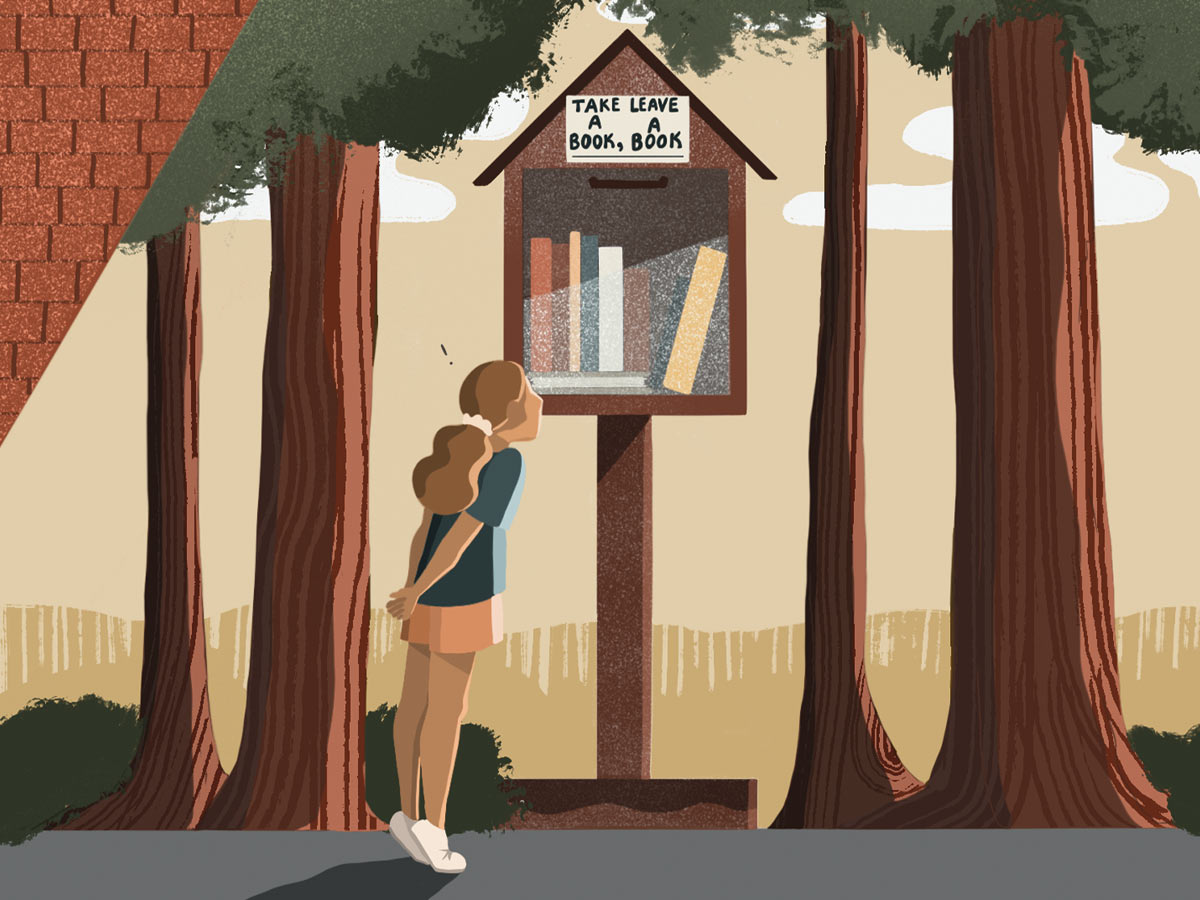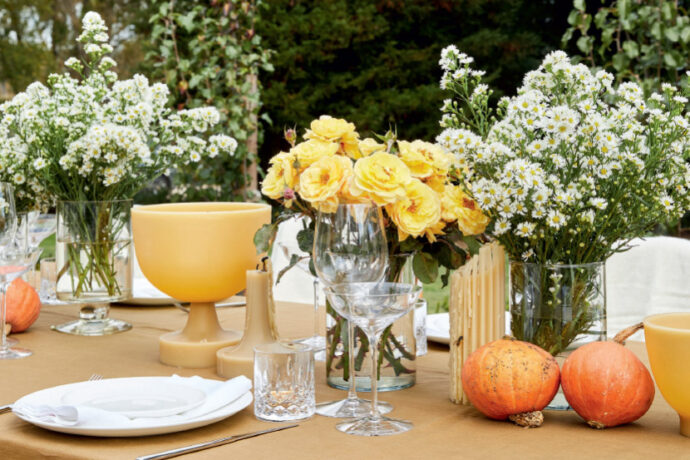
Book-sharing is springing up all over the world as a way to recycle, while bringing communities together
It’s a sweet-pea scented afternoon in early autumn, and I’m sitting in a patch of sunshine on a step outside photographer Cammie Toloui’s terraced house in the south of England. There’s a cabinet that sits over her front garden wall, a repurposed 1930s display case with two sliding glass doors. It has been painted an eye-catching bright red, with six words stencilled on its roof:
‘Take a book, leave a book.’
The contents don’t look like much – a random collection of around two dozen second-hand books, in various states of disrepair. Yet this cabinet has brought a community together, fostered neighbourly relations, and enabled strangers to become friends. It’s the sort of magic formula beloved of civic-minded politicians and, as its instructions imply, the idea is simple: you can take a book, leave one, or do both. As time goes on, the contents of the cabinet changes, which means there are always different titles on display.
The concept of the book-swap box is not new, and many forms of exchanges now exist. ‘It comes from wanting to share stuff with your neighbours,’ she explains. ‘People might exchange food, poetry, or set up a bicycle-repair station in the front of their house.’ Cammie says she’d been considering a street library for a while and then when her community went into lockdown in 2020, it seemed like the obvious thing to do. ‘We couldn’t go to the library or bookshops,’ she says. ‘I ran out of things to read and I felt this was the right time.’
Community spirit
From the start, the project brought the neighbourhood together: the art deco cabinet was donated by someone in the next street, and Cammie and her husband, actor Jonathan Cullen, constructed the box. He stripped and sanded the cabinet, then repainted it bright red and built a roof to keep the elements out. They then fixed it to their bike shed so it was overhanging their front wall, and Cammie painted the legend on the top.
It was a hit from day one. In fact, while I’m sitting on the step drinking tea, passers-by call out with praise for the box. ‘It’s amazing,’ says neighbour Nina as she walks past. ‘It’s the highlight of my returning home in the evening. I look at it every day, even if I’m in a hurry. In fact, everyone who comes to visit me looks at it as well.’ Later on, more neighbours stroll by. One is waving a book. ‘Just finished this from your box,’ he calls to Cammie, and offers up a brief review of the novel in question.
Talking point
‘It’s definitely brought us closer to people we don’t know,’ says Cammie. ‘It’s often difficult to get people to talk to each other. But the library somehow makes it easier. You have something to focus on, but also people want to talk about their reading material. And from our living-room window, we hear strangers stopping to talk to each other about what’s in the box.’
Cammie’s initial aim was for people to donate their much-loved reads and not, as she says, ‘to dump unwanted orphans’. Yet, as they’ve found, one person’s ex-doorstop might be another’s undiscovered treasure. ‘The beauty of books is that we all like different ones,’ says Cammie. Jonathan adds: ‘You can take a chance on them. I’ve found a couple of gems – recently I read one called Washington Black by Esi Edugyan, which is set in pre-Civil War America. It was a real discovery.’
Whether they’re located in a recycled cabinet or a disused phone booth, these little libraries all tell a story with a happy ending
Booklover Jo agrees. She regularly stops by her local community bookshelf in Mackay to browse the display. ‘Most of the time, the titles I take home are ones I’d never normally select but here I can just give them a go,’ she says. ‘The books themselves are completely random. You might find lots about the Russian Revolution, for example. Recently, I’ve picked up both a Chinese cookbook and a really old travel guide to France.’
Unlike Cammie and Jonathan’s cabinet, the Mackay street library is totally uncurated. In fact, Jo embraces the fact that people often dump their aged copies on its shelves. ‘I like that they’re usually pretty old and worn. They’ve lived a life, and they’re lucky they’ve been donated, because a charity shop would likely send them to be recycled.’
Sunny disposition
There appears to be no downside to a street library – as long as they complement, rather than compete with, public libraries. In fact, the only Whether they’re located in a recycled cabinet or a disused phone booth, these little libraries all tell a story with a happy ending problem that’s arisen is perhaps a cultural one: Jonathan and Cammie have found that people are too concerned about sticking to the perceived guidelines.
‘Often people will say to me, I’m just taking a book, but I will leave one later. I tell them it’s not a rule,’ says Jonathan. I must admit that in my ignorance I’d thought the same thing, and had come ready-prepared with a few preloved titles to slot into the cabinet.
While browsing through before leaving, I too am taken with the eclectic nature of the contents: Wild Swans by Jung Chang, My First Dictionary, and a Jeffrey Archer novel, among others. In the end, I take a chance on a pulp-fiction paperback that I’d never normally read. I leave while another passer-by stops as the late afternoon sun glints on the cabinet’s paintwork – this bright red heart of a community, brought together by a collection of crumbling books.
Community Chest
A few tips for starting your own swap
• For inspiration, check out examples of book exchanges from around the world (see right).
• The website streetlibrary.org.au has free plans and advice if you wish to build your own cabinet, and they sell ready-made ones too. Or, like Cammie and Jonathan, you can repurpose an existing item of furniture. Be careful to make it as waterproof as you can, or your books might get ruined.
• Fix the box somewhere eye-catching at the front of your house, making sure it’s not in the way of passers-by or traffic.
• Paint a sign on the box with clear instructions.
• Spread the word with people on your street, or post about it on your social media channels. You can also register it on streetlibrary.org.au to help others find your street library.
• Load it up with your own second-hand books to start. You’ll be surprised how quickly the contents get recycled.
• After that, there’s not much to do, apart from some light curating if a book languishes for months. Enjoy the conversations you hear from your window, and relish the chance to meet like-minded bibliophiles in your locality. Who knows? Your cabinet might be the start of some beautiful friendships.
Global Initiatives
You don’t have to use a cabinet for your exchange. Here are a few alternatives for people who think outside the box
Australia: on a train Started by two friends from Melbourne, Books on the Rail involves leaving preloved copies, decorated with a sticker, on public transport for others to pick up and enjoy. From historical fiction and memoirs to psychological thrillers and colouring-in books, this novel new movement is now making tracks all over the world. Find out more on Instagram @booksontherail.
The UK: in a phone booth If you’re passing through a country village, you might spot one of Britain’s famous red phone boxes, freshly painted and housing not a payphone, but second-hand books. With underused booths now on sale for £1 each, many of them sited miles from the nearest public library, communities have converted them into book exchanges.
Germany: in a tree Disguised as a tree on a leafy street in Berlin’s Prenzlauer Berg, Bücherwald (book forest) is a book exchange built into several trunks standing upright, with shelves hammered into them. Constructed in 2008, it is still going strong today as a part of the city’s famous sharing culture.
The Philippines: in an architect-designed shelter The Book Stop Intramuros, a giant mobile book exchange located on Plaza Roma in Manila, has seating and shelter for bookworms eager to spend time browsing and reading, whatever the weather. Government-funded, the design has won several international awards.


















